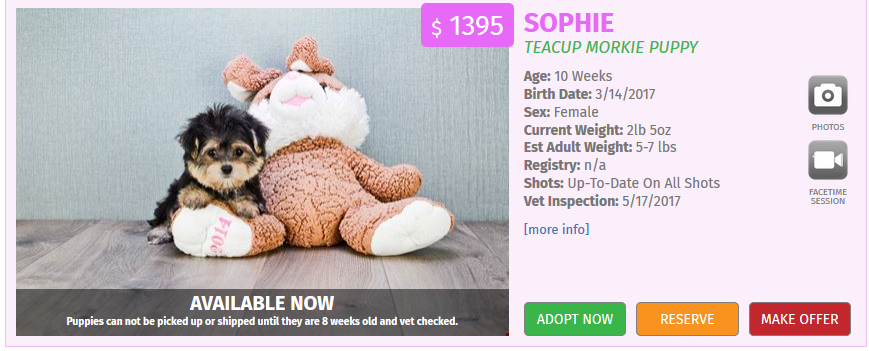|
Puppy Mill Awareness Day is observed on the third Saturday of September of each year. It is a date set aside to help educate the public on the topic of “puppy mills” so that they understand what the phrase means and they can make better personal choices. Many organizations across the country will be holding events on weekends this month as they work to educate the people in their communities. I encourage everyone who either loves dogs or who is just interested in how tax dollars are spent to devote a little time to learning about the puppy mill industry. The key to ending this industry is public awareness and our own behavior; we must simply stop buying what the mills are selling and instead get our dogs from other sources like animal shelters, rescue groups and reputable breeders. (While I prefer for people to adopt or rescue dogs, I fully recognize that some people will insist on getting a dog from a breeder. I simply ask that they interact with a small scale breeder who adheres to breed standards, who ensures the dogs are well cared for and who would never sell dogs in a pet store). There is much disagreement about the phrase “puppy mill.” As I have written before, I consider a puppy mill any commercial dog breeding operation because I focus on the word “mill.” In a recent Supreme Court decision out of Missouri, a puppy mill was defined as a “commercial farming operation in which purebred dogs are raised in large numbers.” Smith v. Humane Society of the United States, 519 S.W. 3D 789, 801 (2017). I have been told by some that use of the phrase puppy mill is so offensive to some dog breeders that they equate it with a racial slur. I say that to take a description of a business operation and try to compare it to discriminatory words related to race is not only misplaced, but is surely offensive to those races which have been slandered through the use of slurs. A mill is an operation which has volume output, whether it is a paper mill, a textile mill, a cotton mill or a puppy mill. Not all puppy mills are created equal. Some are run by people for whom dog breeding is a family affair and has been for generations. Although they raise dogs in large numbers, the dogs are housed in comfortable buildings, they receive regular veterinary care, they are exercised daily and they are socialized to people. Although I do not approve of commercial breeding of dogs, I do acknowledge that some breeders do take good care of the animals they mass produce. Others, quite unfortunately, are nothing short of dog prisons where dogs are kept in small, cramped cages (most of which do not have a solid floor surface) and in which the focus is entirely on profit. The dogs do not leave the cages. They do not receive veterinary care and are not socialized to people. Many have severe physical and psychological issues even though they are “purebred” dogs and may be registered with the American Kennel Club or some other purebred dog registry. Contacts of mine who have been to puppy mills, and to the dog auctions used to market the dogs, tell me that it is a traumatic experience never to be forgotten. The sounds, the smells and the sheer volume of suffering are things which stay with you forever. The reality, however, is that most people will never be exposed to the conditions in which the dogs live and think very little about it. It is easy to see the cute puppy in the pet store window or on the polished looking website or the little dog in the store parking lot and think not one bit about where that dog came from. All puppies are cute and we are easily blinded by the cuteness we see. I have long thought that if there was a requirement that the dog being sold was displayed with images of it’s parents and images of the place from which it came (or perhaps even real world video of that place) no one would buy a puppy mill dog. Ever. So, how can you become aware about puppy mills? - If you live in an area where an organization is hosting a Puppy Mill Awareness event, I encourage you to attend. Most are family friendly and are appropriate for children because the organizations want to educate children in order to reach new generations of people who will someday share their homes with dogs. - If you do not live close to an event, I encourage you to take 86 minutes out of a day to watch the documentary film, “Dog by Dog.” This is a wonderful look into the money and power aspects of the commercial dog breeding industry which keep the factory farming of dogs alive and thriving. You will no doubt be surprised to learn how political this issue is even though it relates to “man’s best friend.” The film is available on a host of platforms including Netflix, iTunes, Amazon, Youtube, Vudu and Google Play. -Consider reading "Bark Until Heard." This book was written by a dog lover who learned some very hard lessons about the dog breeding industry and who shared those experiences with all of us. Becky's book is wonderful in many ways, but what I love about it most is that it will resonate with most dog lovers on a personal level and may help others find their own voice on behalf of dogs. - Take some time to educate yourself about puppy mills and about the commercial dog farming industry. I have a number of blogs on the topic here which you can find using the keywords which appear here on the right hand side of my blog page. I also recommend spending some time on the following websites: Harley's Dream - End Puppy Mills National Puppy Mill Project The Puppy Mill Project ASPCA Puppy Mill Information A time will come when puppy mills are simply part of our shameful past. For me, that day cannot come soon enough. I know a lot of people are working really hard to educate the public and to enact legislation in their cities and states to try to regulate the industry. As an example, California is very close to legislation which would ban all retail sale of dogs in pet stores. It is incredibly timely that AB 485 just passed in the California Senate by a vote of 32 to zero. The bill will now go to back briefly to the Assembly Floor for a concurrence vote on the amendments adopted in the Senate and then to Governor Brown's desk for signature. AB 485 states that as of January of 2019, "a pet store operator shall not sell a live dog, cat, or rabbit in a pet store unless the dog, cat, or rabbit was obtained from a public animal control agency or shelter, society for the prevention of cruelty to animals shelter, humane society shelter, or rescue group that is in a cooperative agreement with at least one private or public shelter. . ." This is huge news and it should be applauded not just by the residents of California, but by all of us who oppose the commercial breeding and sales of dogs and who care about how dogs are bred and treated. It is entirely possible that this legislation will be embraced in other states and will spread in a positive way. As they saying goes, "dare to dream."
0 Comments
Your comment will be posted after it is approved.
Leave a Reply. |
AuthorI am an animal welfare advocate. My goal is to help people understand some basic issues related to companion animals in America. Awareness leads to education leads to action leads to change. Archives
July 2024
Categories
All
image courtesy of Terrah Johnson
|



 RSS Feed
RSS Feed